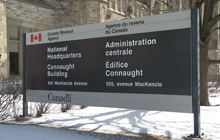CRA discipline statistics shockingly low for number of service complaints

Tax lawyer David Rotfleisch says taxpayer abuse should be disciplined as well
TORONTO, June 11, 2018 – The CBC published an interesting story on May 28, 2018, about more than 1,000 Canada Revenue Agency employees who were disciplined for misconduct over the past four years. Sadly, the story did not garner much media attention, which is unfortunate because the CRA and its employees affect literally all adult Canadians. The statistics were based on reports tabled in Parliament as well as information provided directly by CRA.
It has long been known that little short of a CRA employee shooting a supervisor will result in termination of employment. The statistics seem to bear this out.
Given that there are more than 40,000 CRA employees, 250 discipline cases a year is a shockingly low number, in my opinion. In 30 per cent of the cases, the discipline ranged from a 20-day suspension to termination of employment, meaning a maximum of 75 employees were fired. I find it hard to believe that there is such a low level of egregious conduct warranting dismissal at the CRA.
Employee offenses relating to mishandling either CRA or taxpayer information constitute the largest category of misconduct comprising some 40 per cent of all actions. These are also the types of misconduct that tend to garner headlines, quite rightly so. Privacy concerns are paramount in our current information age. Privacy breaches, especially by the CRA, expose Canadians to serious risk.
Do service complaints warrant discipline?
However, what I find most unsettling, is that taxpayer service-related issues do not appear to warrant any disciplinary action by CRA. As tax practitioners, many of us have been exposed to conduct by CRA collectors, auditors and appeals officers that is outrageous and verges on the scandalous.
The CBC story quotes Conservative revenue critic Pat Kelly as saying he was disappointed the CRA did not provide more information about the case of the B.C. couple, Tony and Helen Samaroo, who were awarded $1.7 million for malicious prosecution by CRA employees.
While this is an extreme example of over-the-top behaviour, in our tax law practice at Rotfleisch & Samulovitch we have come across numerous cases of CRA employees not adhering to the Taxpayer Bill of Rights and of ignoring detailed submissions and issuing assessments after a tax audit which ignores facts and misinterprets the law.
We have seen similar behaviour from appeals officers who ignore our submissions and the law and force the taxpayer to go to the Tax Court of Canada at great cost to achieve a just tax result. We have seen collections officers frequently lying to taxpayers about their obligations, such as to corporate shareholders, telling them they are personally liable for corporate tax debt.
We often file service complaints in these types of situations. We know there is no practical effect to these service complaints, but hold the naïve view that perhaps if enough service complaints are lodged against an individual employee, that employee will be the subject of discipline action. Obviously not!
Closure for those who can afford it
The result of bad behaviour by front-line CRA employees depends entirely on the wealth of the taxpayer. For those Canadians lucky enough to afford to pay for professional tax representation, their tax affairs will usually be sorted out favourably to them but their pocketbook will take a hit. For anyone unable to afford to pay for representation, the results of CRA taxpayer abuse is a tax debt that will likely cause extreme hardship and even bankruptcy.
If you or I failed to perform our services adequately, we would expect to be dismissed by our clients. If we cause damages to the client we (or our insurers) can expect to compensate the client. Why is it different with CRA employees? Why are they not held accountable for their lack of service and at the very least disciplined?
Does anyone in CRA management look at service complaints? Does anyone at the CRA consider service complaints to be relevant to management of their organization? Not as far as I know.
David J. Rotfleisch, CPA, CA, JD is the founding tax lawyer of Rotfleisch & Samulovitch P.C., a Toronto-based boutique tax law firm. He appears regularly in print, radio and TV. With over 30 years of experience as both a lawyer and chartered professional accountant, he has helped start-up businesses, resident and non-resident business owners and corporations with their tax planning, with will and estate planning, voluntary disclosures and tax dispute resolution including tax litigation and voluntary disclosures. Visit www.Taxpage.com and contact David through david@taxpage.com.
The views and opinions expressed by contributing writers to Canadian Accountant are their own. Canadian Accountant and its parent company bear no responsibility for the accuracy and opinions of contributing writers.










(0) Comments